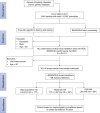Machine learning-based lifetime breast cancer risk reclassification compared with the BOADICEA model: impact on screening recommendations
- PMID: 32565540
- PMCID: PMC7463251
- DOI: 10.1038/s41416-020-0937-0
Machine learning-based lifetime breast cancer risk reclassification compared with the BOADICEA model: impact on screening recommendations
Abstract
Background: The clinical utility of machine-learning (ML) algorithms for breast cancer risk prediction and screening practices is unknown. We compared classification of lifetime breast cancer risk based on ML and the BOADICEA model. We explored the differences in risk classification and their clinical impact on screening practices.
Methods: We used three different ML algorithms and the BOADICEA model to estimate lifetime breast cancer risk in a sample of 112,587 individuals from 2481 families from the Oncogenetic Unit, Geneva University Hospitals. Performance of algorithms was evaluated using the area under the receiver operating characteristic (AU-ROC) curve. Risk reclassification was compared for 36,146 breast cancer-free women of ages 20-80. The impact on recommendations for mammography surveillance was based on the Swiss Surveillance Protocol.
Results: The predictive accuracy of ML-based algorithms (0.843 ≤ AU-ROC ≤ 0.889) was superior to BOADICEA (AU-ROC = 0.639) and reclassified 35.3% of women in different risk categories. The largest reclassification (20.8%) was observed in women characterised as 'near population' risk by BOADICEA. Reclassification had the largest impact on screening practices of women younger than 50.
Conclusion: ML-based reclassification of lifetime breast cancer risk occurred in approximately one in three women. Reclassification is important for younger women because it impacts clinical decision- making for the initiation of screening.
Conflict of interest statement
The authors declare no competing interests.
Figures


References
-
- Ferlay J, Soerjomataram I, Dikshit R, Eser S, Mathers C, Rebelo M, et al. Cancer incidence and mortality worldwide: sources, methods and major patterns in GLOBOCAN 2012. Int. J. cancer. 2015;136:E359–E386. - PubMed
-
- Bouchardy Magnin, C., Pury, P., Lorez, M., Clough-Gorr, K. & Bordoni, A. Trends in breast cancer survival in Switzerland. Bull. suisse du Cancer4, 326–328 (2011).
-
- Jones T, Duquette D, Underhill M, Ming C, Mendelsohn-Victor KE, Anderson B, et al. Surveillance for cancer recurrence in long-term young breast cancer survivors randomly selected from a statewide cancer registry. Breast Cancer Res Treat. 2018;169:141–152. - PubMed
MeSH terms
LinkOut - more resources
Full Text Sources
Other Literature Sources
Medical

